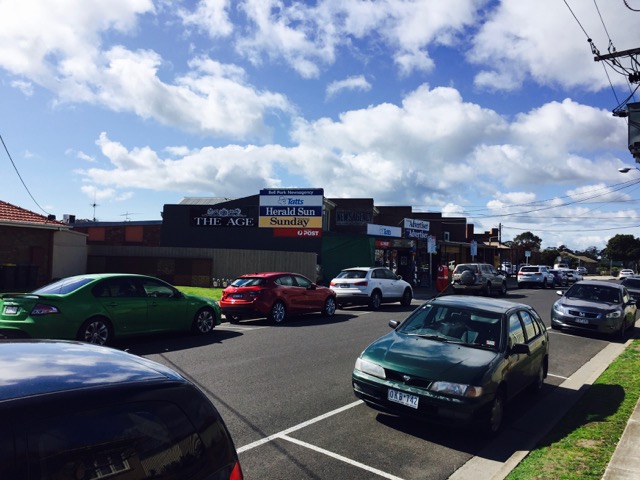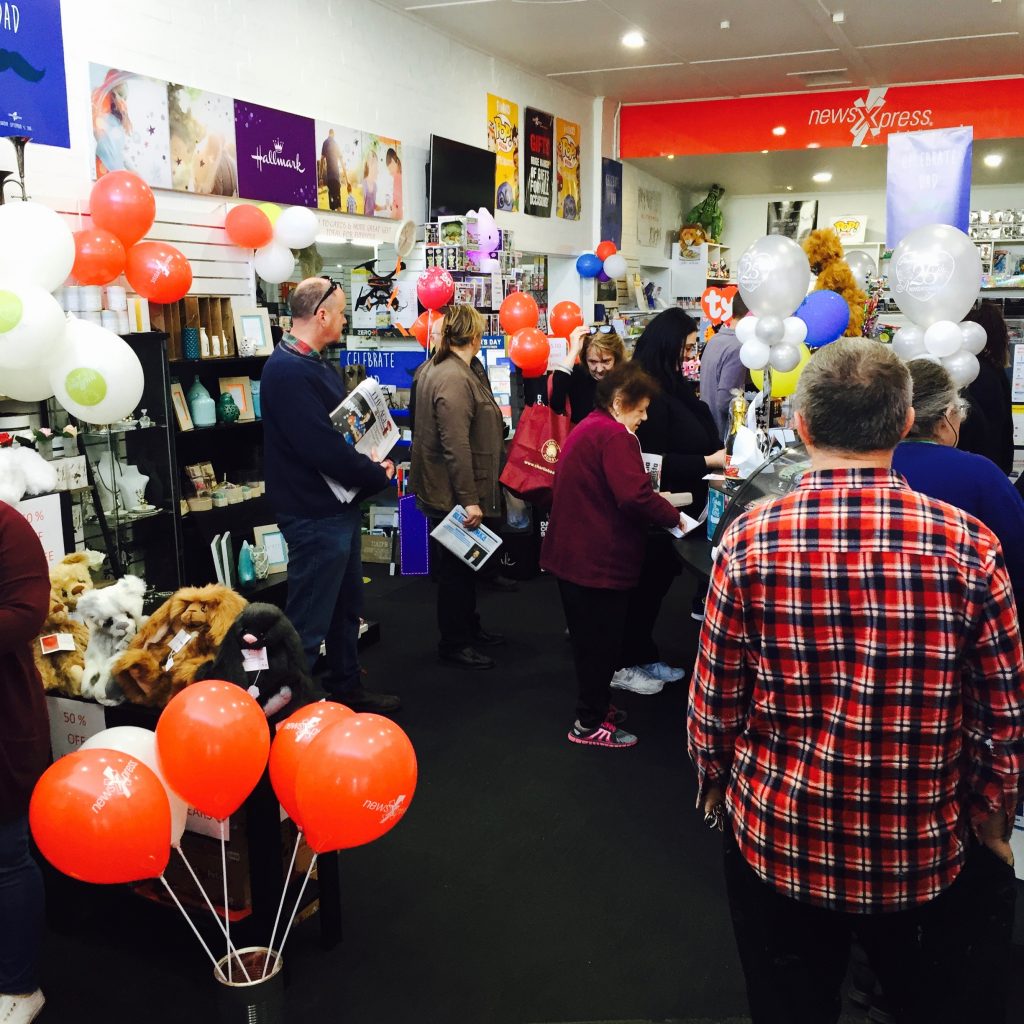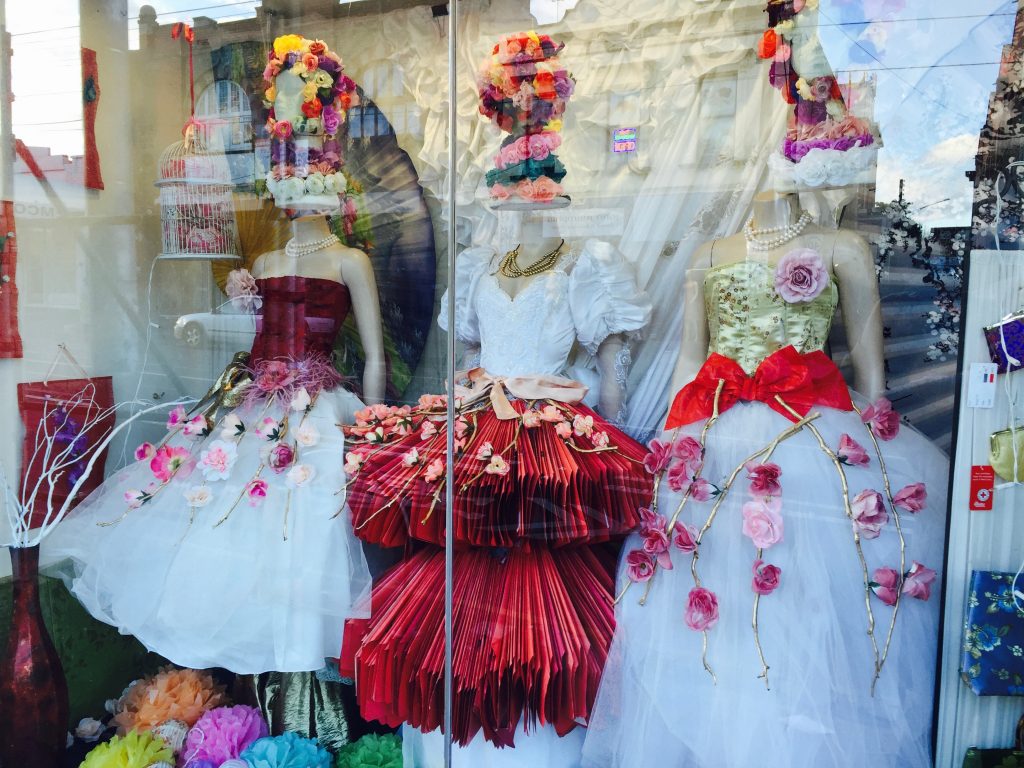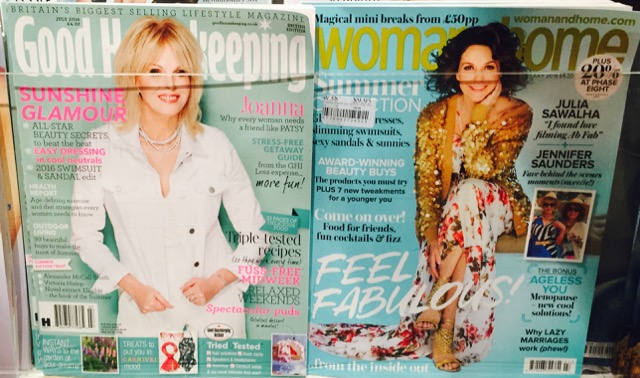Sunday newsagency challenge: review your hours
Is your open for the right hours? Are you open too long? Are your hours too short? Are you closed when you should be open? re you open when you should be closed?
Business hours are not something to set and forget. They should be reviewed at least annually with adjustments made that deliver to you the best possible financial outcome.
Take a careful look at your hours and see if adjustments are warranted.
Sunday newsagency marketing tip: the easiest way to boost sales of anything edible
For an immediate boost in sales of any edible item you sell in your newsagency, offer a sample to taste. Chocolate shops do it. Fudge shops do it. Ice cream shops do it.
While I have seen newsagents offer tastings, it is usually for premium or new lines. My marketing tip today is to do this for everyday candy. Test it with a Mars Bar. Cut one up into small pieces and offer a tasting. Executed well, this should lead to impulse purchases.
Work your way through the chocolate bars and, hopefully, help your shoppers reconnect with your candy lines.
Sunday newsagency management tip: complain to the person who can fix your issue
While it can feel good to complain to friends or colleagues about a supplier to your business who has let you down, the most important person to complain to is the right person at the supplier business. This should be the first place you contact.
While some suppliers have poor customer service in place, most serving our channel have good practices. Too often, their customer service processes are not engaged when something goes wrong. Too often they hear about an issue because a newsagent has complained to someone else.
Touch offers update on east link scanning issue
Touch Networks has provided this update on the Eastlink toll account scanning issue that has been frustrating newsagents:
Dear Valued Customer.
Recently you have contacted our Customer Service Department regarding issues with scanning Late Toll Invoices.
We have been collating as much data as possible to investigate this issue, at this stage our investigations have not uncovered the root cause of this issue.
Please be assured that Touch is looking into this matter as a priority and as soon as we have an update regarding this issue we will advise.
If you have any more instances of this issue can you please record the following information and advise us via email or phone:
Time and Date of the Transaction
Screenshot of Error
Log Files for the Time of the Transaction.
A Scanned Copy of the Invoice.
Your Business ID or Terminal ID
This information will greatly assist us in finding the root cause of this issue.
If you have any questions please feel free to contact us on 03 9018 6800 or email at us support@touchcorp.com
The evolving role of small business accountants and how newsagents can get more from their accountant relationship
 I have been at Xerocon South, a conference for Xero users, accountants and bookkeepers from the Asia Pacific region, in Brisbane for the last 2 days.
I have been at Xerocon South, a conference for Xero users, accountants and bookkeepers from the Asia Pacific region, in Brisbane for the last 2 days.
I was there for my POS software company Tower Systems, a Xero partner.
Over the two days I talked to more small business accountants than I have in years. We talked about changes in their businesses and the businesses of their clients. Change is everywhere.
Plenty of these accountants have newsagents as customers so, naturally, we got to talk about newsagency businesses even though this is not why I was there.
It was a good two days talking with people who help retailers and other small business owners work on their businesses.
One insight was that accountants are changing their businesses in response to significant changes in the nature of their work. Whereas a small business accounting was labour intensive from bookkeeping to other record keeping, now it is more about insights as the paperwork has been replaced by collected solutions such as Xero and MYOB that link directly to POS software.
Accountants have had to change their businesses to stay viable as the bookwork has become less human based. The challenges of change due to technology driven disruption is not dissimilar to what newsagents face in their newsagencies.
As accountants are taking on more advisory and strategic planning work for clients, they are looking for better data, consistent data on which they can rely to provide insights. Some who deal with newsagents praise their clients for their data while others bemoan the inaccurate record keeping.
What was most interesting was the desire among accountants for less time to be spent on bookkeeping. They want the change that is disrupting a traditional income source in their businesses. They are chasing change. They want data to flow automatically, daily, between retail software and the accounting software and from there to the accountant. This enables them to better serve the strategic needs of the business rather than being bogged down in bookkeeping that serves a need but is not focussed on business efficiency or growth.
This is true for newsagents, the need is as real as ever to spend less time, capital and space on declining parts of the business and more on growth areas. What accountants are doing is exciting and it encourages me that if they can do it more newsagents can given that accountants have historically be considered to be risk-averse conservative business people.
Being price competitive is important if you claim to have the best prices
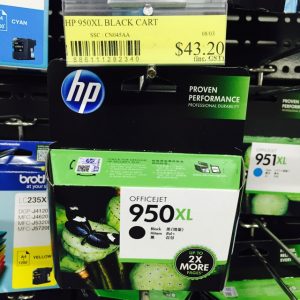 I am not a fan of claiming to have the cheapest prices, the best prices in town or offering a price guarantee that we will not be undersold.
I am not a fan of claiming to have the cheapest prices, the best prices in town or offering a price guarantee that we will not be undersold.
It is my experience retailers making such claims are not the cheapest, offering the best prices or ensuring they deliver the best price so they don’t pay out on a guarantee.
Some product categories in newsagencies lend themselves to price comparison. Ink is one such category, making it important to get right so that you can show, rather than tell, that you have a compelling price offer.
HP 950XL is a popular ink product. It is one of those ink products people look at to judge your pricing policy on ink.
In two different newsagencies I visited this week I have seen HP 950XL priced at $43.20 (as shown in the photo) and $61.00 in another newsagency a short drive sway.
The price difference is a surprise. In the more expensive newsagency the pitch is that their prices are the best. They promote a price guarantee with a 5% discount off the low price if it is less than their price. The cheaper newsagency makes no such claim. They are simply cheaper. Probably a bit too cheap when you research the price for HP 950XL at Officeworks and online.
My feeling, having researched online and offline prices for HP 950XL, is that it should be prices at $59.99 or $99.99 for two as part of an everyday low ink prices strategy. That is my approach.
Ink purchases are often last minute. Selling two cartridges at a lower price today is a good strategy given how people tend to purchase ink. This is my experience in the city at least. In regional and rural areas things could be different.
You need to be price smart – making the most yu can while being seen to be competitive with major competitors.
But back to the two newsagencies I visited this week. I was surprised that the business making a noise about price was the most expensive. What is even more confusing is that the website for the group the more expensive business is part of has a different price, more expensive again.
Inconsistency between online and offline price can turn off shoppers. As more newsagents transact online through their own websites and group websites they will need to be disciplined on price. Otherwise, they risk shoppers turning off when they find different online and offline prices for the same item.
It is easy for these mistakes to happen. The challenge is shoppers and competitors are unlikely to bring them to your attention.
Why ink matters to newsagents.
Newsagents keen to pitch they are price competitive should consider ink as an ideal product category through which to do this. My advice is to research Officeworks, Australia Post, Harvey Norman and JB HiFi. Pitch your price close to theirs. Ideally, just below. They are your main competitor. While beating another newsagent might make you feel good, the other newsagent is not your biggest competitor by volume.
The challenge of the city or country high street newsagency in Australia
WARNING: In this post I reference newsXpress as I draw on experience gained through my role with newsXpress. I issuing the warning to get it out of the way. If you don’t want to read about a newsXpress initiative, stop right here.
350 newsagencies will close in Australia this year.
Most newsagency closures will be suburban newsagencies, high street newsagencies in cities and towns across Australia, usually in strip situations with only a few supporting retailers in the strip.
If you wonder where I get the 350 number from, it is from several major national suppliers to our channel. The number is similar to the closures last year and lower than the number some anticipate for next year.
I don’t want 350 newsagencies to close, but they will. Many don’t need to.
For many newsagencies, being able to open the door each day is a struggle. These businesses are at the front line of the combined challenges of declining newspaper and magazine sales, the decline in tobacco product sales, the migration of lottery sales online, the encroaching on traditional newsagency lines by supermarkets, national retailers and discount variety stores and the resurgence of Officeworks – in an environment of oversupply of major and regional shopping centre space, ever increasing labour and lease costs and tough banking conditions.
While some have confronted these challenges by diversifying, many have not. This is where most of the closures are occurring, in traditional newsagencies relying on papers, magazines, lotteries, stationery and not much else.
I understand the challenge of change and that for someone who got into their newsagency business twenty or more years ago they may not see themselves as a retailer, preferring to be an agent. I saw this recently, in non newsXpress store, in country New South Wales. I have known the newsagent since the late 1980s. While the business was always well presented, clean and tidy, it was only ever a traditional newsagency. Competition passed them by. They knew they had to change. Instead, they faded and, recently, closed.
I would speak with this newsagent at trade shows and they would acknowledge the need for change yet they stood still. That is their decision to make.
Not all high street city and country newsagencies can be transformed. Space, location, capital and other factors could get in the way. My advice is to at least have a go for you know the trajectory of doing nothing whereas doing something could be better, even if capital is limited.
This brings me to the key point of this post, the opportunity of transformation through the focus of one business, newsXpress Bell Park. This is a high street newsagency in the small suburb on the outskirts of Geelong in Victoria. To understand the situation of this business, take a look at this photo:
I have known the business and its owners for twenty-five years. They have run a good business, but a traditional business. That started to change two years ago when they joined newsXpress. What they have done and are doing is an example of transformation that can occur in a high street situation.
By reducing overheads for declining products, changing the shop floor without using a shopfitter, introducing new, traffic generating, product and promoting the business outside the business with stories of new products to uncover people who may never have visited before.
Last Saturday I was in the business for a special event to mark the twenty-fifth business anniversary and to launch a new range of exclusive collectible products sourced through newsXpress. The event was a testament to what can be achieved in a high street situation.
Having the owners point out new faces to the business was a thrill. Watching customers happily spend hundreds of dollars in a single purchase was also a thrill. Having customers say the shop looks nothing like a newsagency was wonderful.
Andrew and Jill, the owners of the business, have made many small moved in the business over the two years. Each step is a venture into a new area, in pursuit of a new future beyond what it might have been for a traditional newsagency. How they have done what they have done would not be obvious if you walk into the business. This is good as it is a local competitive advantage.
New traffic generation has been a key goal along with greater shopper value. Both strategies are complimentary yet different. They involve buying, location, merchandising, loyalty and marketing. They require you to work on your business differently, not as a high street newsagent.
What they have done and are doing is an example of what a currently traditional newsagency can do.
I get to see plenty of newsagencies like newsXpress Bell Park, including some non newsXpress businesses, that are transforming or have transformed from the dying traditional newsagency into a more relevant retail business that in parts of the business respects some long-standing newsagency lines but for the most part is this new exciting business offering locally what shoppers might have driven to a city to purchase.
There are opportunities for high street newsagents who want to grow to redefine their businesses outside the traditional newsagency model. But time is short. It starts with being committed to change. This is why newsagencies close, because the owner procrastinates and they drown by being traditional.
I will wrap up with some photos from the event last Saturday. I was busy talking to people and did not get photos at the peak busy time.
VM masterclass from a Red Cross op shop
The front window of the Red Cross op shop on Bridge Road in Richmond is always inspiring. The window always tells a story. It attracts people to the window and into the shop – like all good visual merchandising should.
Here is the current stunning display in this op shop window.
I love this display. It is a perfect window display as it is so good that people will tell others to go and have a look.
Everything about this display is excellent including colour choices, connecting with the season (Spring), having fun and pitching what they have inside.
Best of all, this display plays against what you might expect to see in an op shop window.
We need displays as appealing as this on in newsagency windows, displays that play against type, that challenge public perception of what they will see in side the business. This is key to attracting new people into the shop from those who pass by.
If you are ever on bridge Road Richmond, take a look at th window display for the op shop, it will inspire.
NOTE: Click on the image to get a larger version to see in detail what they have done.
New Lottoland ad continues to mock newsagents
Lottoland is running a new TV commercial in Australia. The new ad continues their narrative that newsagents are out of touch. I think this ad denigrates the channel.
Lottoland should focus on the features of their offer instead of attacking one of the outlets through which competitor products are available.
That is what is most interesting about the Lottoland pitch, they are not taking on Tatts, they are not taking on On The Run or other convenience stores. No, they are taking on newsagents by mocking us. I suspect this is because they see newsagents as an easy target who won;t fight back.
If I had lotteries in my business I’d be hoping Tatts would support me with a campaign promoting newsagents in a more positive light than shown in the Lottoland ads.
Front-end loyalty the Father’s Day traffic boost in the newsagency
Last Saturday offered an excellent demonstration of the commercial value of a front-end loyalty program compared to the old-style loyalty program.
It was the Saturday before Father’s Day, the busiest day of the Father’s Day season. Plenty of new faces in the shop, plenty of people we might see once or twice a year.
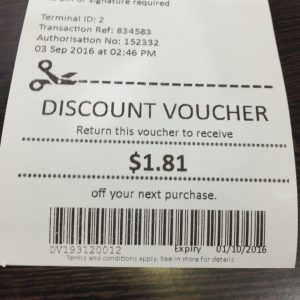 Most shoppers spent enough to qualify to receive a Discount Voucher on their receipt, offering an amount off their next purchase. Plenty of them looked back in the shop for opportunities to spend the reward. This is a key goal of the vouchers, to get infrequent or one time only shoppers to look back into the business for what else they could purchase.
Most shoppers spent enough to qualify to receive a Discount Voucher on their receipt, offering an amount off their next purchase. Plenty of them looked back in the shop for opportunities to spend the reward. This is a key goal of the vouchers, to get infrequent or one time only shoppers to look back into the business for what else they could purchase.
The vouchers are called a front-end loyalty for an important reason – whereas points-based programs have shoppers work toward a reward, discount vouchers dangle the reward that is achievable with one more purchase.
In any retail business seeing infrequent and one time only shoppers, a loyalty offer like discount vouchers is more valuable than a points based program. And today these infrequent and one time only shoppers are important as our businesses change and the customer mix evolves.
People understand money. With all the different points based programs out there understanding the value of points is far more difficult.
But back to last Saturday, the day before Father’s Day. I had one customer who bought a card use their discount voucher for a subsequent purchase valued at more than $50.00, another customer spent their voucher on a two small collectible plush items saying they would be back for more and yet another customer spent their voucher on several birthday cards because they don’t live locally and wanted the saving.
Talking to customers it was easy to see the importance of putting an amount in front of them, an amount they can spent right away. Chatting with one customer they made the point they were over the loyalty cards – they’re all the same. I agree with that sentiment. Points are no differentiator. Cash is. And the extra traffic from Father’s Day is a perfect opportunity to renew the focus on this still fresh approach to loyalty.
I know of several locals who will be back because of the voucher they received for their Father’s Day purchase. That right there is gold as the voucher is the lure, the very practical lure. If the in-store pitch is right and lure works, you can win valuable long term business.
We have other shoppers in the business who purchase magazines from us instead of Coles 20 metres in front of us because of the vouchers. I like that they help us compete against a giant competitor spending millions advertising their points based loyalty program.
Here is my advice on this approach to loyalty.
- Start. yes, stop thinking about it and just start. Get some learnings and adjust your setting as you go.
- Make sure your employees know how to pitch the voucher. keep it simple. Face the voucher to the customer. Point to the discount amount.
- Where you have price control over what you sell, mark-up with the knowledge of the voucher program. Lift prices slightly. The voucher program can cost you nothing.
- Don’t promote vouchers except across the counter. Tell all employees the success of vouchers is on them.
I have been involved in developing, watching and learning about shopper loyalty for 30+ years. While my own software offers loyalty points, FlyBys integration and other program integrations, it is the discount voucher option that more small business retailers love.
Now before anyone says this blog post is as ad for my newsagency software company Tower Systems, it is not. I want newsagents to take a modern and more competitive view of loyalty. I note that Tower is not the only newsagency software with discount vouchers.
Playing cards, a protractor and a chinagraph pencil reinforce relevance of the newsagency
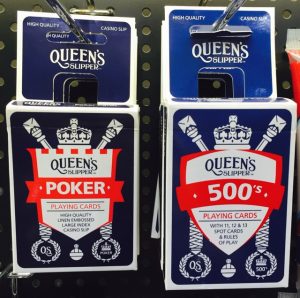 Three customers on Saturday, within a few minutes of each other, reminded me of an appreciated role the local newsagency can play.
Three customers on Saturday, within a few minutes of each other, reminded me of an appreciated role the local newsagency can play.
While for sure we have transformed the business into new, non-newsagency, categories with the majority of the floor space looking nothing like a newsagency, we have maintained core newsagency lines – but in considerably less space.
The first customer asked if we had 500 playing cards. We did. They were thrilled. Price was not an issue. They commented they could probably get them from K-Mart but who wants to go looking in there, it’s so big. They loved that they were in and out in a couple of minutes.
A couple of minutes later a customer asked if we had a protractor. I took them straight to the one size we have in stock. They were not sure what a protractor was and didn’t necessarily trust the advice and the label on the pack. They sent a photo to their child and got a photo back. Satisfied, they purchased. Again, price was not an issue. Walking back down the aisle the customer threw their arm over my shoulder in a half hug. I didn’t know where to get one. Now they know about us.
And then, a couple of minutes later, a customer came in asking for something to write on glass. It was for a special celebration. In a couple of minutes we had a range of options for them to consider. It was the chinagraph pencil that they liked partly because it felt more appropriate to their need and partly because they thought they weren’t made any more. They bought the pencil and a far more expensive white marker as a backup, just to be sure. Price was not an issue. They made a point at the end – this is what customer service is all about.
Each of these items, the playing cards, the protractor and the chinagraph pencil are all old school newsagent items. While we are known for them, they are not sufficiently high volume in traffic generation or revenue for us to rely on them for a bright future. But they can play a role in the mix – as long as we are efficient in space allocation, good with shop floor customer service and t not too far off the path of what a newsagency is.
In each examples I have shared here the biggest factors in our favour are: the shop does not look too daunting to find what you are looking for, shop floor customer service is accessible and the engagement is personal.
Our big business competitors are challenged when it comes to accessible knowledgable shop floor staff who want to engage with customers.
The difficulty for us is how do we package the customer service point of difference? You can’t say it in your ads or in a sign as it sounds meaningless, like any sales claim. The only way to promote it is through providing the best experience every time, an experience so good that customers talk about it.
Thinking back now on my experiences on Saturday, from a marketing perspective the only thing I should have tried, even though it sounds weird, is to take a photo with each of the customers. Those photos would have made good Facebook posts and that could be another way to get stories like these out there without engaging in direct advertising.
I think at the very least we should be regularly talking on Facebook and elsewhere about these low-volume yet important items for which we used to know known and that we still stock today. But we need to be quirky, interesting, in what we say. Posts like these all through the year could be valuable in rebuilding attention for these stable lines.
Watch the Cyber War episode of Four Corners
The Four Corners episode, Cyber War, on ABC TV last week is a must watch for any business owner, any mobile phone user, anyone using a connected device.
I say it is a must watch program because of the facts presented about hacking on our own soil. The show presents a challenge to business owners to ensure business systems and computers are appropriately protected.
Sunday newsagency challenge: stand for something next
What comes after Father’s Day? What do you have planned for the business from today until Christmas really kicks in? Do you have a plan? You need a plan. You should have had a plan a couple of months ago when planning for coming out of a major season for this period before the next major season starts.
Knowing what’s next is vital in retail where the everyday on which you rely is not as strong as it was years ago.
Now more than ever shop floor engagement and out of store marketing are vital to attract new shoppers and we cannot rely on major seasons only to do this for if we do we become like gift shops and they are closing faster than newsagencies.
So: What comes after Father’s Day?
Sunday newsagency marketing tip: bring your frames to life
 Every frame you have on display in your newsagency should have a inspiring image or saying in the frame. This provides context for the frame and helps it to be seen as a gift. The right art can make any frame a perfect gift. This is an ideal project for a younger team member. Give then freedom to bring joy to the shelves of your newsagency.
Every frame you have on display in your newsagency should have a inspiring image or saying in the frame. This provides context for the frame and helps it to be seen as a gift. The right art can make any frame a perfect gift. This is an ideal project for a younger team member. Give then freedom to bring joy to the shelves of your newsagency.
Here’s how to know this is a good idea: the regular frame in the photo I have posted here would look boring on a Facebook post. The frame in the photo, with the image we added, is fr more appealing. The image gives us a reason to promote this frame outside the business as the product has something of us in it.
Sunday newsagency management tip: don’t let employees choose when to end a shift
In a newsagency recently I saw a note from the owner to an employee saying stay longer if you think you need to. This is like a customer saying to a retailer sell me more products if you think I should buy them. You are a retailer, you will want to sell as much as possible. An employee will want as many hours as possible, especially if, as in this case, the hours are overtime.
My management advice today: do not let employees set their own hours. Be the boss, be responsible for the operating costs of the business.
Is Father’s Day the same-old in your newsagency this year?
What have you offered for Father’s Day 2016 in your newsagency? Is your gift offer the usual mix of mugs, stubby holders, fishing rod BBQ lighters, frames, drink coasters, coffee table books, pens, man cave signs, retro signs for the garage, lottery ticket packs, golf related gifts and / or dad joke books?
It is through these annual seasons that attract extra shoppers to our businesses that we should seize the opportunity to reposition our businesses.
By reposition I mean we should not carry the traditional items for these seasons.
Our major season offer should be completely fresh and focus on new stock, items we did not carry for this season last year. We should change the range, change the message and change our focus. Our businesses need to look different.
You want people saying aren’t you a newsagency any more? I quietly cheer when I hear this.
So, today, the last major retail day for Father’s Day 2016, take a photo of your display, take note of what you have offered and commit to not doing the same thing next year …unless, of course, your sales are up this year on last year and you did offer the traditional Father’s Day gifts mentioned above.
We have to break the pattern for these major seasons for the sake of our future for if we keep doing the same thing year in year out we will lose shoppers who have moved on.
You don’t want to be known as the old school newsagent, there is no future in that.
Independent gift shops face the same challenge, the need to chase change, to redefine the appeal of their business during major seasons by pitching items they do not usually offer at that time.
It is hard work, redefining the approach of a season from scratch when you may have done the same thing with the same suppliers for many years.
The thing is – if you don’t do the hard work your seasonal sales will fall and your year round sales will fall and this is not good for the business or you.
So, I urge you to look at your Father’s Day 2016 and be prepared to put that approach behind you in pursuit of a completely fresh offer for next year.
Gifts are not what they used to be.
Should you call the police on a shoplifter?
I was asked by a retailer today if they should call the police on a shoplifter they caught? I said yes! I can’t imagine why you would not.
Regardless of whether the police will take the matter further or not, it is respectful yo the business and yourself to do everything possible to bring people caught shoplifting to account.
I am posing this issue here to hear what others think. Would you report every shoplifter?
Smart magazine placement in the newsagency
In a newsagency a couple of days ago I noticed this smart placement of magazines – Jennifer Saunders on the cover of one title and Joanna Lumley on the cover of the other title.
In several newsagencies I have visited since the titles were not located together. While this is not a big deal, it highlights the value of an engaged person who puts out magazines, who places titles to make the most of the opportunities.
I love seeing smart placement like this with these two titles.
Because geeks can be dads and dads can be geeks
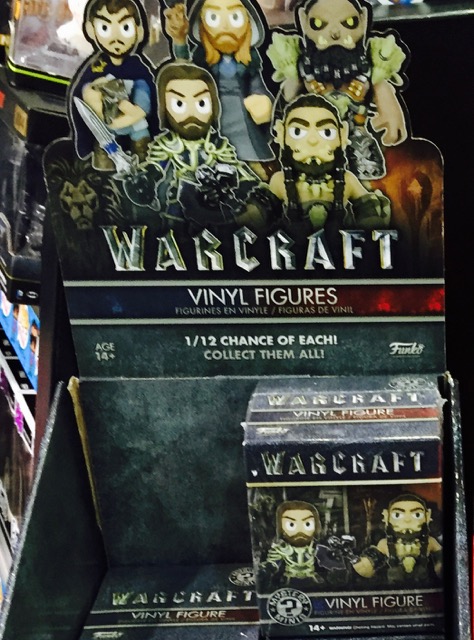 We have resisted the temptation for a traditional Father’s Day gift range in the newsagency this year. Instead, we have shone a light on existing products and categories in-store that reflect the diversity of father’s we can serve.
We have resisted the temptation for a traditional Father’s Day gift range in the newsagency this year. Instead, we have shone a light on existing products and categories in-store that reflect the diversity of father’s we can serve.
Take dads who are gamers, geeks, nerds or similar in terms of cliched labelling. They could get more pleasure out of a Warcraft blind box – such as you can see in the photo – as a gift than a book, a voucher, socks, underwear or a coffee mug.
The kid buying dad a Warcraft blind box is making a thoughtful purchase, demonstrating they know their dad and his passion. Any dad into Warcraft, and there are plenty, would be happy with the blind box as the figurine in the box could sit in their car or on the desk at work as a reminder of the cool kid they have raised for them to know this is a perfect gift.
In this era of fascination with pop culture, it is items like these warcraft blind boxes that are ideal as a pitch for Father’s Day rather than the traditional you find many gift wholesalers pitching.
I think we need less in our newsagencies of the traditional for major seasons like Father’s Day and more of the quirky collectible that respects the passions of the recipient. That is why the kid giving their dad a Warcraft blind box is likely to have done better than a sibling giving the same dad a coffee mug – unless it is a Warcraft coffee mug … all this depends on the dad being a warcraft fan.
We don’t have to understand these things for us to engage as retailers. But we do need to be guided by people who understand them.
Gifts are changing, rapidly. Yu can see this through the rapid change in gift shops around the country. They are closing and opening at a fast rate, as are wholesalers as the supply side goes through consolidation. I think those changes are occurring because businesses have failed to keep up with the most sought after trends, licences that appeal to deep and long term collector interest.
I am following a similar approach with cards too, promoting quirky cards and licenced cards. While I still have cards with yachts and golf images, I’m not featuring these in out of store promotions as they give off a traditional image I don;t ant to be connected with when promoting the business to people who do not currently shop with us.
Learning from Ryman on how to do Back To School
Newsagents doing Back To School in Australia should take not of how Ryman in the UK is handling this important retail season. The Back To School page on their website is well worth reviewing. It gives the impression of being able to serve any need.
I also love the marketing they are doing on social media offering free delivery.
Ryman has 20 stores in the UK. Typically, they are considerably smaller than Officeworks in Australia – better run too with a local feel to them.
Are Newspower stores among the highest performing in the country?
 The folks at Newspower may want to check the marketing sent today as they claim: Newspower Newsagents are some of the highest performing in the country.
The folks at Newspower may want to check the marketing sent today as they claim: Newspower Newsagents are some of the highest performing in the country.
I am not aware of any evidence to support this claim.
For Newspower to make this claim they would need access to the business performance data of all newsagencies. They do not have access to this.
My long-established newsagency sales benchmark studies, which I publish here, that started when my newsagency was a Newspower store, represent the most comprehensive comparative analysis in the channel yet even that does not cover all stores. It does, however, cover data from businesses in all groups except for the WA lucky charm franchise.
I am not aware of any evidence supporting the Newspower claim.


